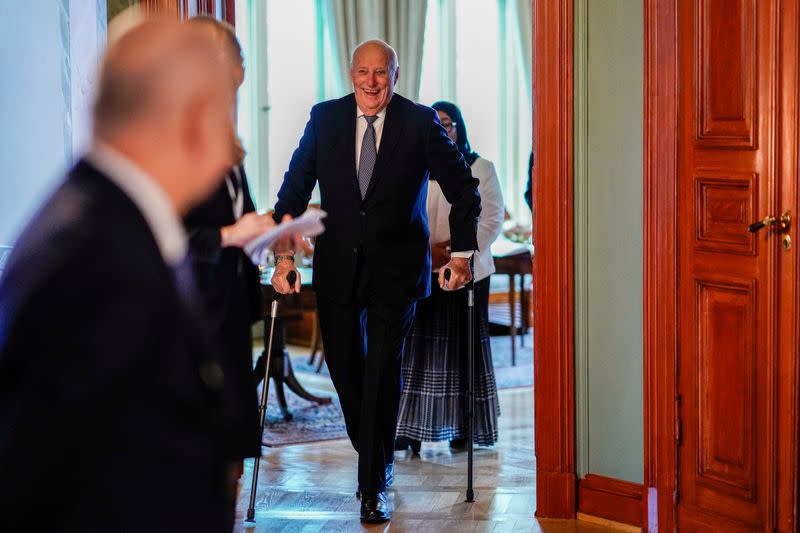Norway's reform-minded King Harald, 87, to cut back activity

By Terje Solsvik
OSLO (Reuters) - Norway's 87-year-old King Harald will permanently reduce the number of official activities in which he takes part out of consideration for his age, the royal household said on Monday following the monarch's recent bout of illness.
Europe's oldest living monarch and Norway's ceremonial head of state since 1991, Harald was hospitalised in February for an infection while on holiday in Malaysia and later received a pacemaker to help compensate for a low heart rate.
Harald resumed his duties as head of state on Monday after almost two months of sick leave. He has ruled out abdication, however, insisting his oath as king is for life.
"The king will make adjustments to his programme in the future, out of consideration for his age. This will entail a permanent reduction in the number and scope of activities in which the king participates," a palace statement said.
A great great grandchild of Britain's Queen Victoria, the king ascended the throne in 1991 and slowly introduced modern touches that brought a ceremonial post seen mainly as a symbol of independence into the 21st century.
His marriage in 1968 to a commoner broke with tradition and followed a nine-year stand-off with his father that ended only after Harald threatened never to marry rather than give up the woman who became his wife, Sonja Haraldsen.
Harald once said in an interview that Europe's royal families should not be tempted to reverse moves towards openness and retreat to their palace towers.
"If you've opened the gate it's very difficult to close it again," he told Reuters and a British newspaper. "I'm not sure I'd want to close it. So far so good, as far as I'm concerned."
Harald struggled in his early years to replace his father, the extrovert Olav, known as the "People's King" for his down-to-earth style and frequent interaction with the people.
But he has been successful in emulating his father's approachable style, travelling to the scene of natural disasters, wearing rubber boots and a well-worn jacket, to meet those who had lost homes or loved ones in floods and storms.
HEALTH SCARE
When right-wing anti-Islamic fanatic Anders Behring Breivik massacred 77 people in 2011, the king consoled the nation with a powerful televised speech, saying in a voice trembling with emotion that "freedom is stronger than fear".
The royal household gradually modernised under Harald's supervision, setting up an official website and publishing annual spending accounts.
As a man, Harald inherited the throne despite having two older sisters, a practice that also benefited his son Haakon, who also has an older sister.
But in 1990, a constitutional change eventually paved the way for women born from then on to inherit the throne, placing Haakon's oldest child, Princess Ingrid Alexandra, in the line of succession when she was born in 2004.
Harald had a health scare in 2003 when he was diagnosed with bladder cancer, and another in 2005 when he underwent heart surgery, but made a full recovery from both.
In 1998, the king faced public criticism over press reports that he had accepted a 4-million-crown ($667,700) yacht from a group of industrialists as a birthday present, and that palace repairs had cost the government 500 million crowns.
Around the same time, his former deputy private secretary suggested Harald should abdicate at Norway's normal retirement age of 67.
Opinion polls gave the king firm backing to stay on for life, however, and the criticism subsided. A year later, in another Reuters interview, Harald joked that he would remain on the throne for life unless he went mad.
(Editing by William Maclean)


